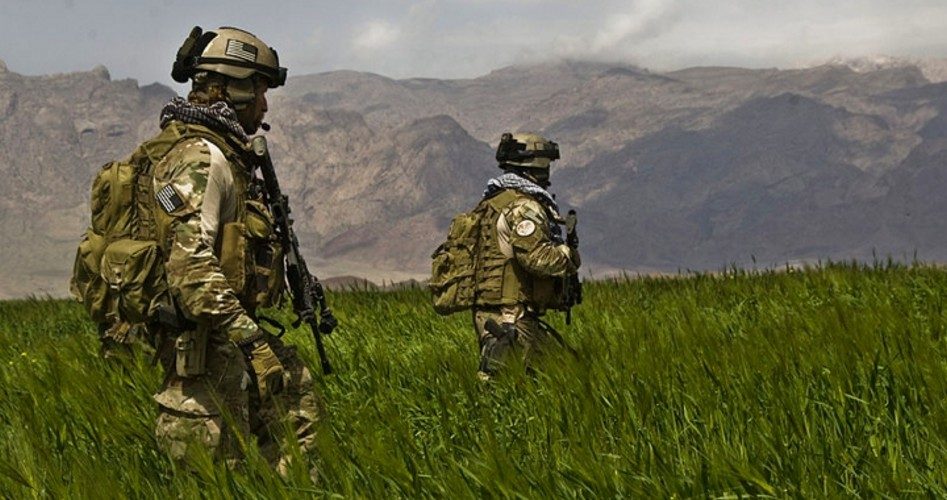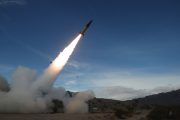
President Obama Wednesday morning asked Congress to authorize the use of ground forces against the Islamic State in Iraq and Syria, warning that the Islamic extremists “pose a threat beyond the Middle East, including to the United States homeland.” The president is expected to deliver a statement on the request at around 3:30 p.m. EST.
The proposed legislation would ban “enduring offensive ground combat operations,” while providing “the flexibility to conduct ground combat operations in other, more limited circumstances, such as rescue operations involving U.S. or coalition personnel or the use of special operations forces,” Obama said in a letter transmitted to Congress along with the legislative proposal.
The authorization would be limited to three years unless Congress reauthorizes it. It would repeal the 2002 legislation authorizing the use of military force against Iraq, but not the broader 2001 legislation, passed three days after the 9/11 attacks, enabling the use of force against al-Qaeda and its affiliates. The ambiguous ban on “enduring ground operations” is intended to win the support of Democrats reluctant to authorize another Middle East war, as well as Republicans who support using ground troops.
“It’d be interesting to know exactly what that ‘enduring’ means, but I have to see it,” Arizona Republican John McCain, chairman of the Senate Armed Services Committee, said Tuesday after members of Congress had been briefed on the resolution. McCain favors giving ground troops the maximum flexibility to go after Islamic militants trying to seize control of Iraq and Syria. The authorization would not limit operations to those two countries, but would give the military the green light to pursue ISIS forces wherever they go.
“I know in the beginning people were talking about Iraq and Syria, but they’re in eight countries today,” said Bob Corker (R-Tenn.), chairman of the Senate Foreign Relations Committee. “Basically, if it was geography-specific, what you’d be saying to ISIS is, ‘If you’re not in these places, you’re safe.’ So it absolutely has to be very flexible relative to geography.”
Dick Durbin of Illinois, the Senate’s second-ranking Democrat, said he is satisfied with the three-year time limit, which goes beyond the remainder of President Obama’s term. That means the next president will have to “start thinking immediately about the renewal” of the authorization, he said. McCain found the three-year time limit “agreeable,” and Senator Lindsey Graham (R-S.C.) told reporters he could “live with” the language banning “enduring ground operations.”
The United States and allied nations have conducted thousands of airstrikes in Iraq and Syria over the past six and a half months and have about 3,000 military advisors in Iraq, assisting the Iraqi army in combating the ISIS forces. In addressing the nation on the conflict last September 10, President Obama stressed the limited role of Americans on the ground.
As I have said before, these American forces will not have a combat mission — we will not get dragged into another ground war in Iraq. But they are needed to support Iraqi and Kurdish forces with training, intelligence and equipment. We’ll also support Iraq’s efforts to stand up National Guard Units to help Sunni communities secure their own freedom from ISIL’s control.
The Islamic extremists have continued to shock much of the world with their brutality, celebrating their savagery by releasing videos showing the beheadings of three American, two British, and two Japanese citizens. A video showing the burning alive of a captured Jordanian pilot has further inflamed the outrage over their acts of barbarism. But after nearly nine years of fighting in Iraq and more than 13 years in Afghanistan, the American people might wonder why it is up to the United States to send more of its young men and women halfway around the world to fight in another Middle East war when the nations in the region — Iran, Syria, Jordan, Turkey, and others — have more than enough weapons and manpower to defeat and destroy the estimated 20,000 to 30,000 armed fanatics of ISIS.
As for the ban on “enduring ground operations,” few aspects of wars have been more unpredictable than their duration. The mighty British empire in 1775 no doubt expected to squelch the uprising by the “cowardly dogs” (Brigadier General James Wolfe) and “poor species of fighting men” (Henry Ellis, Royal Governor of Georgia) in her North American colonies in rather short order. Both sides in America’s Civil War believed at its outset that it would be over in a matter of months, not years. German Emperor Wilhelm II is said to have told his troops, as they went off to battle in August 1914, that they would be home before the autumn leaves fell. No one predicted the war would last more than four years and claim the lives of some 8.5 million soldiers on all sides, along with an estimated 13.5 million civilians.
In Korea in 1950, General MacArthur told his troops they would be home by Christmas. The invading Chinese Communist army cancelled their holiday plans. In the early years of the Vietnam War, Secretary of Defense Robert McNamara predicted all American troops would be out of the country by the end of 1965. We missed that deadline by a decade. And in 2002, as the United States was preparing to invade Iraq, Defense Secretary Donald Rumsfeld offered his prediction on how long Americans would be fighting and dying there. “Five days or five weeks or five months, but it certainly isn’t going to last any longer than that,” he said.
A three-year time limit on a war authorization may seem sufficient to some in Washington, but if Americans are in the thick of battle at the end of that time, the authorization, as Senator Durbin suggested, could and probably would be renewed. The issue is not whether Senator Graham or his colleagues on Capitol Hill can “live with” the ambiguous ban on “enduring ground operations.” What no one now knows is how many Americans will die with it.



